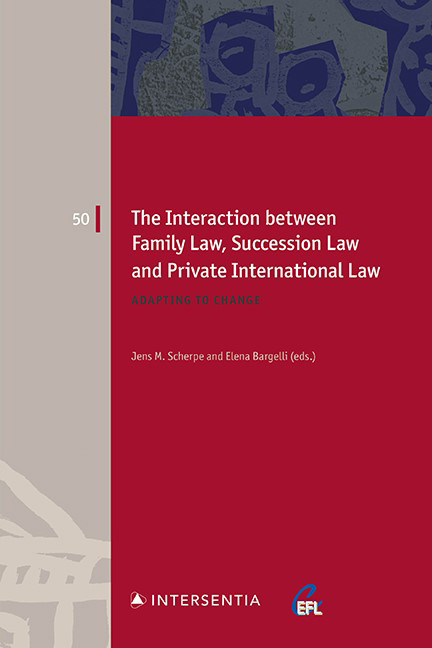Book contents
- Frontmatter
- Acknowledgements
- Contents
- List of Cases
- List of Contributors
- The Interaction between Family Law, Succession Law and Private International Law: An Introduction
- PART I THE IMPACT OF DEVELOPMENTS IN NATIONAL FAMILY LAWS ON EU PRIVATE INTERNATIONAL LAW
- PART II THE IMPACT OF EU PRIVATE INTERNATIONAL LAW ON NATIONAL FAMILY LAWS
- PART III THE IMPACT OF NATIONAL SUCCESSION LAWS ON EU PRIVATE INTERNATIONAL LAW
- PART IV THE IMPACT OF EU PRIVATE INTERNATIONAL LAW ON NATIONAL SUCCESSION LAWS
- Index
- European Family Law Series
EU Formalities for Matrimonial Property Agreements and their Effects on German Family Law: Calling the Bluff?
Published online by Cambridge University Press: 25 May 2021
- Frontmatter
- Acknowledgements
- Contents
- List of Cases
- List of Contributors
- The Interaction between Family Law, Succession Law and Private International Law: An Introduction
- PART I THE IMPACT OF DEVELOPMENTS IN NATIONAL FAMILY LAWS ON EU PRIVATE INTERNATIONAL LAW
- PART II THE IMPACT OF EU PRIVATE INTERNATIONAL LAW ON NATIONAL FAMILY LAWS
- PART III THE IMPACT OF NATIONAL SUCCESSION LAWS ON EU PRIVATE INTERNATIONAL LAW
- PART IV THE IMPACT OF EU PRIVATE INTERNATIONAL LAW ON NATIONAL SUCCESSION LAWS
- Index
- European Family Law Series
Summary
INTRODUCTION
EU Council Regulation 2016/1103 on jurisdiction, applicable law and the recognition and enforcement of decisions in matters of matrimonial property regimes requires that matrimonial property agreements be concluded in writing. However, if the term ‘matrimonial property agreement’ is understood to include all agreements between spouses concerning property, it would significantly change German family law. This is because in addition to matrimonial property agreements dealing with the matrimonial property regime (Güterrecht), German courts have recognised a number of supplemental ‘family-specific contracts‘ (Nebengüterrecht) that couples are said to conclude implicitly. Such agreements may, for example, concern the family home or services one spouse provides to support the other‘s business. Formalities such as writing were never required for these agreements, unlike for matrimonial property agreements on the matrimonial property regime as such, where a notarial deed is required. In fact, in these cases, couples are rarely aware that they conclude a legally binding agreement at all. Therefore, German academics have argued for some time that such contracts are not really concluded at all, but have simply been ‘invented‘ by judges who are unhappy with the results of the matrimonial property regime (whether default or chosen). If EU law now demands that all kind of agreements between spouses concerning issues of financial importance must be in writing, this case law might have to be abandoned.
This chapter begins with an introduction of the so-called Nebengüterrecht (see section 2 below); the courts have created these agreements, which spouses allegedly conclude without explicitly expressing their intention to do so. The instruments of the Nebengüterrecht sit between matrimonial property law and contract law (see section 2.1 below). They raise conflict-of-laws questions (see section 2.2 below). In the future, conflict-of-laws issues regarding the Nebengüterrecht shall be answered under the application of the EU matrimonial property regime. In principle, the Regulation is applicable to the Nebengüterrecht. (see section 3.1 below).
- Type
- Chapter
- Information
- The Interaction between Family Law, Succession Law and Private International LawAdapting to Change, pp. 79 - 100Publisher: IntersentiaPrint publication year: 2021



